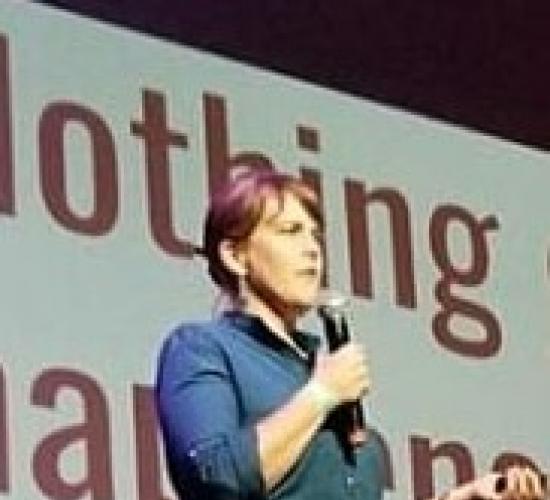When the Association of Independents in Radio (AIR) was founded in 1988, none of the freelance producers who got the organization off the ground could have foreseen a major development coming the industry’s way: podcasting.
AIR began as a hub for independent producers and media makers looking for support in advocating for themselves in the audio space. It has since grown into a home for more than 1,300 journalists, podcasters, story editors, audio producers, documentarians, engineers, sound designers and media entrepreneurs seeking resources and community.
What unites these diverse AIR members? “We’re all committed to audio storytelling,” the organization’s managing director Amanda Hickman says on an episode of Between 2 Mics. “That’s the work that brings us together.”
Prior to joining AIR, Amanda’s career spanned the media space. She led BuzzFeed’s Open Lab for Journalism, Technology, and the Arts, has taught at multiple prestigious journalism schools and helped launch DocumentCloud, a reporting tool now used by journalists internationally. In the process, she’s racked up an impressive roster of awards as well.
These days, Amanda’s passion is for empowering people working independently in radio and podcasting to push for fair pay and respectful treatment within the industry. She aims to educate AIR’s members — and the audio storytelling world as a whole — about how to get the most out of a freelancing career in the audio biz.
Keep scrolling for Amanda’s advice for anyone working on a podcast as a freelancer or independent contractor.
1. Know when it’s time to advocate for yourself
One of the tricky things about functioning independently as a producer, sound engineer, story editor or a similar role in the podcasting space is that there is very little out there in the way of standardized practices. Podcasting has yet to catch up with other businesses in terms of industry-wide standards for pay, benefits, etc. As a result, it can be easy to be taken advantage of by a client.
That’s where Amanda and AIR come in. “We’re starting to develop some resources to help freelancers and independent producers advocate for themselves and [to] give them something lean on to say, ‘This rate you’re proposing to pay me isn’t reasonable. It’s not adequate. It doesn’t reflect my experience and it doesn’t reflect the work that’s going into this piece,’” Amanda explains.
Just because you are an independent contractor or freelancer doesn’t mean that you don’t have the right or responsibility to advocate for yourself when something with a client seems fishy.
That’s when you need the right resources…
2. Understand the resources available to you
In 2020, AIR reallocated some of the financial resources originally earmarked for travel and conferences into producing workshops to help educate the community.
“We started hiring our own members and people outside our membership to lead workshops for folks who are trying to figure out how to adapt to this universe or to figure out how to grow their show,” Amanda says. “A lot of our workshops are about raising funds, about building audiences. They’re very podcast-directed.”
Workshops like this — along with the growing library of written materials Amanda and her team are assembling — are available to all AIR members. When you feel like you’re running into an obstacle with your work, don’t panic. Instead, consider exploring these resources.
3. If something seems unreasonable to you, ask
All too often, freelancers get intimidated by contracts. And it’s no wonder! That legalese and fine print can get overwhelming… and you might just find your eyes glazing over as you review a contract prior to signing on for a new project or client. Amanda reminds you that even legalese is still English and can be parsed with a little extra time and effort.
That being said, when you are reading a contract, you should follow your gut. If something in a contract feels unreasonable, don’t be afraid to push back. Amanda hopes that AIR’s resources can give people a guide to what’s “normal” and not so normal. This issue is especially critical when it comes to payment.
“As an independent contractor, you get to set your rates and you can negotiate a rate,” Amanda says. “If your client is dictating the rate they pay you and it’s not open to negotiation, that’s one of the little clues that they might be an employer, not a client.”
Trust your instincts on those sneaky little clues — and turn to resources and other experts in the industry if you need a second opinion.
For more of Amanda’s insights about how to empower freelancers in the world of audio storytelling, listen to this episode of >Between 2 Mics. Be sure to subscribe to get future episodes directly in your preferred podcast player.
Zachariah Moreno is the co-founder, CEO, & CTO of SquadCast. He is also a podcaster, author, developer, and designer. He and his team are on a mission to amplify collaboration.
